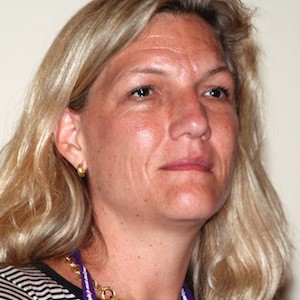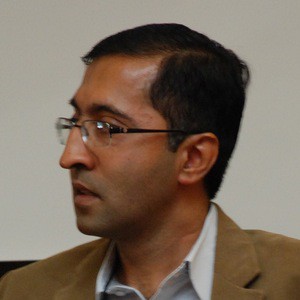John: I’m on a Skype call with Julia Angwin of ProPublica. Thank
you for joining me, Julia. Why don’t you tell me how you got into
journalism, how you started covering tech, what your career path
has been?
Julia: I have an interesting career path, in that I got into
journalism to get away from tech and obviously I was unsuccessful.
I grew up in Palo Alto. My parents were programmers. I
learned to program a computer in fifth grade. I was really part of
this very early PC revolution in the ’80s in California and so my
parents we had five computers at home.
I thought, there was only two careers you could choose from,
engineer or software developer. So I was chugging along on my
journey towards the technology industry. I went to college, and I
worked my summers at Hewlett Packard. But I also started to get
interested in the newspaper.
I started working on the college newspaper. Newspaper was my
rebellion…
…against technology. After I graduated, I had an offer to
go to Hewlett Packard but I thought, “I’m going to have some fun
for a little while.” So I went to Washington D.C.
I worked at the Washington Post as an intern and then the
State’s News Service, which was this tiny little wire service where
you do not make enough money to eat. I did that for a couple years.
Then what happened is, that was the late 90s, people started
to care about technology and I needed a job. Suddenly, I realize
that being a Washington reporter, which is what I had been doing,
was a commodity.
And I had this one skill, that I understood computers, you
know, if only vaguely but more than most people in most
newsrooms. I was hired by the San Francisco Chronicle to come
back to California and to write about…they hired me to write
about…
It was dotcom boom, so it was online retailing and stuff
like that. I went and did that. I very quickly became a full tech
reporter covering Microsoft and Netscape and mostly because I had
had some sense of tech literacy.
John: Wonderful. You went from the Chronicle to the Journal at
that point?
Julia: After I had been at the Chronicle for a couple years, I
remember when Microsoft came out…I covered Microsoft. When their
earnings came out, I remember I came to my boss and I said, “I
don’t understand. I’m looking at these two things.
There’s an income statement and balance sheet and I don’t
really understand the difference. What am I supposed to be looking
at?”
Because I have a math background and a math major, and I’m
techy, that they thought I understood business, so her face
went white. Like, “Oh my god, we thought you knew numbers.” But I
know, like, how to add them. Right? I didn’t know accounting.
She said to me, “You should go to this Bagehot program at
Columbia.” I went to that and did that. I got my MBA, and then I
got hired by the Journal. They hired me in 2000, in January of
2000, which was like, literally, the peak of the dot com bubble
was, like, March of 2000.
They were vacuuming up tech reporters as fast as they could.
I remember they hired me, and I said, “What am I going to cover?”
They said, “Oh, the Internet.” I was like, “Any particular part?”
“No. Anything. It’s all, we need as many bodies on this beat as
possible.”
John: No. Great. You were there for the following decade and then
you’ve left and you’ve gone to ProPublica.
Julia: Yeah, at the Journal for 14 years.
John: 14 years, OK.
Julia: Yeah.
John: That’s good. That’s good. Almost rivals mine, my tenure, at
different times. What did you notice? You escaped tech and then you
used that expertise as your trump card to get back into journalism,
or to move up in journalism.
What did you notice in the world of tech? What changed in
those years as far as, how did companies deal with you?
Julia: It was so great, to go from Washington, where it was,
especially for me, as a junior, junior, junior person, it was
really pack journalism. Right? It was the definition of pack
journalism.
I would go in press conferences with a dozen other reporters
and I would write like this little piece that’s, like, 10 percent
different than the things, other things that had been written. I
went from that environment to tech journalism, and there really was
no pack. It was so great. Right?
You could talk to these executives directly. They had PR
people. But it was a different time where I was also young, and so
I would go out drinking with the same people who I covered in a way
that I had no access to with Congressmen that I wrote about.
I imagine that was a unique moment in time. It’s very
different now. But it was a really lovely time.
John: Because some would argue now, tech journalism is more like
political journalism. The change in the last 12 years has been, now
there’s a pack of people covering tech. It’s akin somewhat to
politics. Do you agree? Do you not?
Julia: It’s worse.
John: You think it’s worse.
Julia: Worse. It’s worse.
John: Why?
Julia: I’ll tell you why. Because political journalism, there’s a
pack, there’s a lot of reporters. But to put it very bluntly,
they’re not funded by the people they write about. Right?
Tech journalism, many tech journalists are funded by
companies that are start-ups with venture capital backing. They are
part of the industry they cover in a way that is totally different
than political reporting. It’s a problem, and so that’s one thing.
Also, I would say this. When I started in tech journalism, I
was unique in being a woman. I was also unique, though, that I
didn’t get into it because I was a gadget freak.
The early days of tech journalism, in my opinion, were
sports journalism. It was fan journalism. Right? Sports journalism,
it in the fan way, not, there is legitimately great sports
journalism. Right?
But it was a reporting on the event. It was like, I went to
the game. I went to the Apple press conference and here’s like how
the players acted and here’s how shiny and glossy it was at the
end.
A lot of the early tech reporters got into tech because they
were the one person in the newsroom who liked to play with gadgets.
Right? I was not.
I got into it, I’ve never been a gadget person. First of
all, I’m a girl, so my gadget threshold is lower, and secondarily,
I’m not, I love technology, but I love it in a more abstract way. I
don’t need to sleep with it.
When I started in tech journalism, I felt very different
than most tech journalists. There’s still a little bit of that in
tech journalism today. Which is, there’s a lot of shiny object
coverage and much less traditional business reporting, which is
what I came into it with a business approach.
John: Yeah. It’s interesting, because some of the, you’re arguing,
in some ways, the same way that some of the people who are in it
for 15 years longer than you have have said about, that they’re
cheer-leading.
What they’ve noticed over the years is the proximity of
wealth to journalism can be very corrupting.
Julia: I’m not sure that that’s true. That journalists can and
have, over history, in many different settings, been close to
wealth and written objectively and fairly.
I would say that I really view the tech issue differently,
which is, there, it’s a structural problem. Right now, the current
structural problem is, you have companies that are funded by the
industry they cover. The journalists are beholden. Right?
And you have an industry, journalism, that is obsessed with
traffic metrics. Those traffic metrics are driven by shiny object
journalism. Shiny objects do very well on the Internet. They are
the same as cat videos. Cat videos and shiny gadgets are a win.
This is a system that feeds on itself, and I always look for
systematic issues instead of people personally being corrupt.
John: Now, that’s a very good point, the structural problem that
you see when people are measuring this. But you don’t, you think
that, absent that, there would still be enough rigor for
journalists to keep their distance from what they cover? Or do you
not?
Julia: I’m trying to think of what would be an appropriate
comparison. Right? Where have we seen great wealth creation in such
a short time in this country? Maybe Detroit?
John: Yeah, maybe Pittsburgh. It’s pick your era, pick your era.
Right.
Julia: What have we seen there? It was a different era in
journalism, but a similar one, because all of the actual papers
were owned by, literally owned by the people who produced these
things. We didn’t see a lot of great journalism from those people.
But you know what we did see? We saw it from other
journalists. Right? We saw the muckrakers in the progressive era,
and the thing about tech is there is some other…it’s not as if
there’s no great tech reporting out there.
There is, but it’s not necessarily being done by what I
would call, “The trade press, the tech press.” That’s probably too
much to ask of any trade press, maybe.
John: That’s a fair assessment. That’s a fair assessment. Do you
think that companies are bypassing journalists more than in the
past because they have a tool to reach directly around them and go
directly to their audience?
Julia: Oh, absolutely. Sure. For sure they are, right?
Google puts things up on its blogs, its biggest news, even
big news that’s detrimental to them…when they were caught
scanning for WiFi signals and pulling in people’s passwords by
mistake, they launched that on their blog to get ahead of the news.
It was the classic “We might as well our lumps ourselves,”
right? Apple is one of the ones that’s more interesting that way.
Everyone says, “Apple is so secretive,” but Apple really
announces its news to the press, right? They don’t do as much in
that way, because they have a very favorable press…
situation.
John: No, that’s true. Everyone comments that “Apple has its
share of fan boys in every sector,” and that’s…
Julia: Oh, yeah.
John: What goes on. Have there been any points in your coverage
where you’ve had “Eureka” moments that technologically, tomorrow is
going to different from today? You’ve been covering this for 18
years.
What have been the things that gave you a pause and said,
“Holy mackerel?” Have there been any?
Julia: I have to say, I’ve always been wrong, right?
I’ve always…no, seriously. It turns out that what I’ve
learned by being a tech journalist is I have no idea what’s going
to be big. The things are going to be big are not, and the things
that are terrible are.
I’m a barometer…they should use me as a negative
barometer for success, right? When the eBay guys came in to pitch
me about eBay at the San Francisco Chronicle, I was like “I have
already seen eight other auction sites that have eight better
features. Yours is not going to work,” right? Wrong.
When Google came out, I was like “Why would I want a
computer-curated search? I have these lovely people at Alta Vista
who human curate the web for me.” I’ve been always wrong, and so
most of my “Eureka” moments are realizing how wrong I am.
]
John: Did you expect social and that changed the audience to be
as huge it’s…remember, you started at a time when, yes, the
Internet had come in, but you still occasionally get snail mail,
you got an email once in a while, and now that audience is right
there with you all the time.
Julia: Yeah.
John: How has that effected you, that nearness to the audience,
that proximity.
Julia: I personally love the proximity.
I will say this, I was right about social. I want to give
myself a slight amount of credit, because I was covering News Corp
at the Wall Street Journal and when they bought MySpace, I told my
editors, “This is going to be huge.”
I realized that they captured something that hadn’t
occurred to me, people just found it too hard to set up a web page. This
process of automating and linking people’s pages to each other
through friendship I realized was going to be big, but it was a
tiny, tiny part of the company, of News Corp.
My beat was really to write about Direct TV and the TV
stations, and so that’s why I left, to write this book about
MySpace in 2007.
I always joke that I was totally right that social was
going to be big. I was completely wrong about the social network
that I picked, but whatever. You know, closer than my
usual score.
I love being close to the audience. That is one of the
greatest gifts for journalists. It used to be you would get a
letter every once in a while from a reader. I always meant to write
back, but maybe I didn’t always write.
Now, I get tips. It’s like a conversation. It’s a great
thing for journalists.
John: Do you think it will get tougher if you get even more
intimate with the audience? I mean the following thing. You were talking
earlier about the corruptive influence of traffic on the page and
how that can change things.
As the metrics get further where you’ll be able to tell how
far down in one of your stories someone reads, is that TMI?
Julia: Yeah. I’m really conflicted about that.
I don’t want to be the person that says, “I don’t want to
know any data.” I’m not constitutionally that way, but that we have
a tendency to put too much impact on the data we have and not to
think about the data we don’t have.
Traffic is the data we have or reading to a certain part
of the page is data we have, but there’s other data out there about
your stories, right?
For instance, maybe it really engaged readers and caused
them to change, right, to do something?
John: Yeah, behavior.
Julia: Maybe it caused legislative change. Maybe there’s impact
that is way down the road like the long tail. One thing, at the
Wall Street Journal, I led this series called, “What they know”
about privacy.”
What was interesting was that it had a hugely long tail.
The day one stories were a classic day one spike page one story. It
wasn’t better or any worse than a page one story, but the long tail
was huge, right?
News organizations don’t fully measure the full amount of
data.
The thing in my heart…I’m still like an engineer in the
sense that in my…despite being concerned about the impacts of
data and privacy, which is what I care about, I also think
sometimes more data might be the answer.
John: Yeah. I can understand that. At the end of the day, you’re
going to want the amount of time somebody spends on your site. I
absolutely get what you mean.
Julia: I’ll say this as a slight plug for ProPublica. The reason I
came here is that I wanted to go from environment of monetizing
traffic to monetizing impact, so we literally sell impact to our
donors.
That’s what we say, “We bring impact,” and that’s what they
give us money for. That’s a better incentive for me as a reporter.
My point is, you can build the structures the way you want to build
them.
John: How have you found the change? How have you found the
change from one to the other? Jarring or is it…
Julia: It’s great. Because ProPublica is a reporter’s dream. Honestly I do
pinch myself in the morning.
I have worked in newspapers for so long the idea that no
one is going to say to me, “Why didn’t you have that? Can you do a
follow?” is still kind of like magic and that I can pursue
whatever projects I want.
I will say this though that I’m really one of the people
who writes the most here at the ProPublica because I get a little
itchy. I’ve got to get stuff.
John: You’ve got to get stuff out.
Julia: I don’t know if I’ll ever get over that the
newsroom thing.
John: No, no. It absolutely is. Have you found that the
relationships among the tech reporters themselves, in other words I
don’t want to say the pack but the pack covering tech, changed over
time?
Because remember at the beginning you said you were one of
the few women out there. At The Chronicle you were alone, and now
there’s much more coverage out there. How would you describe that
arc? Is it more competitive? Is it more collaborative? What’s the
culture like?
Julia: Certainly from a diversity standpoint it’s dramatically
better, right? There are a lot of women, leading women, women
running their own organizations. That’s a great thing because
really the pack was like me and a bunch of guys with beards
when I was younger.
That’s great. The competition is really fierce and that is
to the readers’ benefit because there are so many of these tech
publications. The fiercest competition is who has the first photo
of the iPhone, which is of course a shiny object. It’s going to get
traffic, but there is also competition.
Re/code is a very good example of a site that breaks every
major personnel move in the Valley. That is something that they’re
known for and it’s completely solid, important reporting.
It’s a pretty robust ecosystem. I’m concerned that there
aren’t enough players who are funded other ways, who aren’t reliant
on the same people they write about their funding.
John: Re/code recalled it, and my talks with Walt and Kara
talked about how they specifically looked at who they wanted to
have fund them and who they didn’t.
Julia: Yes, and they were very picky about that, but not everybody
has that choice.
John: No, not everybody has that choice. Have you been surprised?
You have parents who were both in the computer industry. You rant
at technology industry. You ran away from that.
Did it surprise you over the last 20 years the inability of
the news business to innovate in a way? How do you think about
that, the level of innovation in news?
Julia: I would say that it is surprising, and it’s been great,
right? Another reason I came to ProPublica is I love working with
technologists. We have a team of 10 data experts/programmers who I
work with and I sit right next to.
To me that’s the dream, the collaboration, because I really
believe that hacking is a journalistic skill. It’s poking around in
computer systems to find stories.
In fact, that’s a lot of what drove my privacy reporting
was this, “Let’s poke around and see, well, where is the data
really going?” It was really an audit. We were auditing data…
I was amazed at how receptive the Journal was to that, but
it was hard. I had to convince them to pay for technical
contractors, which is one reason I came here. They have that in-
house. At the same time every news organization has committed to
this idea and there’s amazing work that’s going on.
Strangely at the mainstream institutional papers I would
say are leading that in some ways. I don’t see this as big a data
team at the tech trade press…
John: Not since before. When did you realize or do you think that
technology is an existential threat to the news business? Do you
think that?
Julia: I don’t think that, no. I would say there is an existential
threat to the news business out there. I wouldn’t call it
“technology.”
John: What would you call it?
Julia: I would say it’s the inability to monetize their
audience…
John: Because their audience can be replicated.
Julia: Correct, and I’ve been meaning to write this. I blame it in
a large part on privacy issues because the ability to track users
across the Web meant that The Wall Street Journal no longer had a
monopoly on their audience.
They couldn’t sell it because you can find them on the
cheapest website. Whatever the cheapest website of ads that that
same person goes to you can find them there. That has limited the
news business’s ability to monetize their audience. That is such a
crime.
In fact I’ve really been thinking about it. Everyone says
to me, “Julia, why do you care about privacy? What’s the harm? Blah
-blah-blah.” I’ve started to say, “Well, it’s killing journalism.”
“Is that enough for you?”
John: No, exactly because as someone said…I was talking to the
other day, he went into a good point about that the news business
in the United States has really been an advertising business. Since
we can no longer monetize that in an advertising way, it’s an
existential threat.
Julia: Right, but I would say that’s not a technology problem.
That’s a policy problem because the truth is that technology can
let you do whatever you want.
If we said, as a society, that “You know what? You shouldn’t
be able to follow people around and make weird dossiers
about them and sell them over here.” We could do that. We can stop
that in two seconds.
John: You could argue it’s been stopped in parts of Europe or not
as loose as here in parts of Europe, but they’re still feeling
pressure on their news business, too.
Julia: Not as much.
John: Not as much, but still they’re worried there.
Julia: Obviously, there’s also the fact that the news business. It
was like it was a good run.
It was never going to be that good. It was a special time.
It was really a monopoly. They had a monopoly on those audiences.
We’ll never get the monopoly back, but let’s say could we erect a
small fence? Maybe that would be enough.
John: Maybe that would be enough. How do you think journalism has
done covering the last 20/30 years? How do you think we’ve done as
journalists?
Julia: Covering technology?
John: Covering technology.
Julia: We’ve done OK. I wouldn’t say it’s an A. I would say maybe
a B, maybe a C. The reason I say that is that there’s a lot of
shiny coverage and there’s an occasional deep dive.
As much as I thought that I was in this pack journalism
that was terrible in Washington, we still don’t even have that
level of accountability. For instance, every single reporter in
journalism in Washington goes and looks up the FEC filings.
They write about the campaign contributions. It’s part of
the daily thing which is like, “Where’s the money coming from?” and
it holds people accountable on a regular basis. That is just not
regularized in the tech coverage.
Strangely even the core business isn’t that well-covered,
the actual money flows. There’s a lot of, “Oh, Twitter’s huge,” but
there’s not a lot of really important writing about where’s the
money going or what I was talking about now, which is that privacy
has impacted all of journalism.
That core business accountability reporting of these
companies as businesses I would say could be better.
John: It could be better, and it’s not yet on a par where it is
in political journalism.
Julia: I don’t think it is, no, because a political journalist
knows how to look up FEC filing, but not every tech reporter can
read an annual report.
John: Absolutely. Question. Are you optimistic about journalism
going forward?
Julia: I am.
John: Why?
Julia: I have a special problem, which I’m optimistic about
everything. That’s one thing to know. People accuse me of
being irrationally optimistic about privacy and irrationally
optimistic about journalism.
But I will say that for everything that I’ve said about the
way tech isn’t fully covered as well it could be, it’s better than
it was. What it was was very few reporters, no accountability,
and only gadget coverage, so we’re moving in the right direction.
The great thing about the flowering of the Internet is that
news can come from anywhere. Somebody can write a personal account
of something that happened and it can spark a whole news cycle.
Sometimes those things are more important than what the journalists
are writing about.
John: No, that’s true. Do you consider yourself lucky that you
chose tech and not City-Hall reporting because as far as being
optimistic it’s a lot easier right now to be optimistic with your
specialty…
Julia: Yes.
John: I cover City Hall. I cover cops. It’s…
Julia: …by the way, that’s the part of journalism I’m most
worried about, right? City Hall accountability is at an all-time
low and this is a civic crisis. That is terrible. You’re right.
I’m lucky. I do feel like I didn’t quite choose tech
journalism. It chose me. It grabbed me and pulled me back in, but
either way, yes, I’m really lucky to have these skills.
John: That about covers it.
Julia: Great.
John: Thank you very much for your time. This has been…










